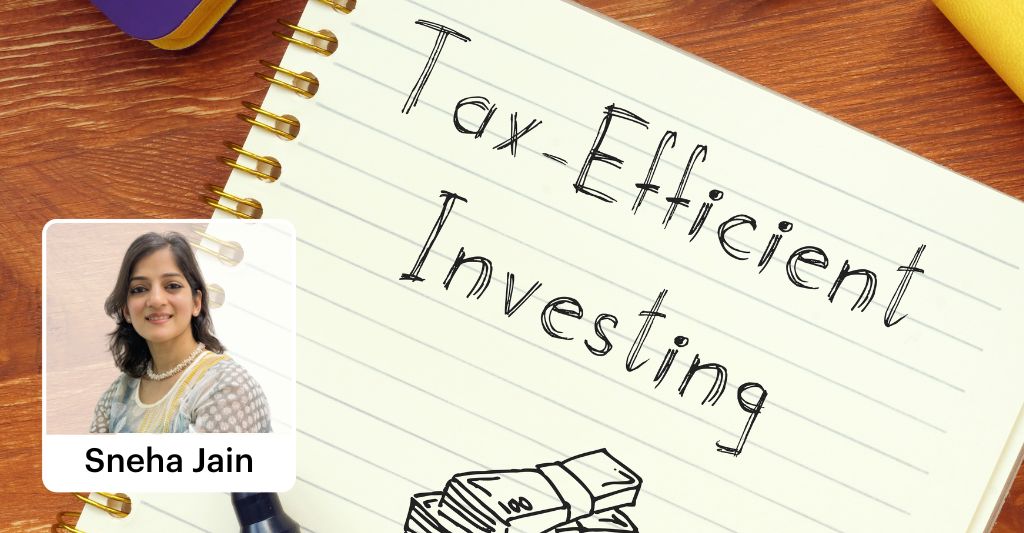Last Updated on Oct 18, 2023 by Anjali Chourasiya
The Indian stock market is currently riding a bullish wave, presenting enticing opportunities for investors. While witnessing your investments grow is undoubtedly satisfying, it’s equally frustrating to see a significant portion of those earnings go towards taxes. To make the most of your investments, it’s essential to not only choose the right assets but also craft a tax-efficient investment strategy. This blog aims to shed light on various strategies and tips to help Indian investors minimise their tax liabilities in the ever-evolving Indian market landscape.
Table of Contents
Understanding tax implications
Before we delve into tax-saving strategies, it’s vital to grasp when and how you might incur taxes in the Indian market.
- Long-Term Capital Gains (LTCG) Tax
When you sell equity shares or equity-oriented mutual funds after holding them for over a year, you become subject to LTCG tax. LTCG on equity investments exceeding Rs. 1 lakh in a financial year incurs a flat 10% tax. Notably, any gains below Rs. 1 lakh in a financial year remain tax-exempt.
- Short-Term Capital Gains (STCG) Tax
If you sell equity holdings within a year of purchasing them, your profits are categorised as short-term capital gains, and they are subject to taxation at your applicable income tax slab rate.
- Dividend Tax
As of 1st April 2020, dividends from stocks are now taxable in the hands of recipients. Companies no longer pay Dividend Distribution Tax (DDT). If your dividend income exceeds a certain threshold, you may be liable to pay tax on it. All the dividend income received is taxable, and the TDS rate of 10% is charged if the dividend income paid is in excess of Rs. 5,000.
Effective tax-saving strategies
With the tax implications in mind, let’s explore actionable strategies to optimise your investments while minimising tax burdens:
LTCG tax benefits
To leverage the favourable LTCG tax rate of 10%, consider holding your equity investments for at least one year before selling. This strategy aligns with long-term wealth creation goals.
Equity-Linked Savings Schemes (ELSS)
ELSS mutual funds provide a twofold advantage of potential capital appreciation and tax savings under Section 80C of the Income Tax Act. Investing in ELSS not only reduces your taxable income but also offers an avenue for long-term wealth growth.
Systematic Investment Plan (SIP)
Systematic Investment Plans in equity mutual funds allow you to harness the benefits of rupee cost averaging and compounding. Additionally, keep in mind that LTCG tax doesn’t apply to gains up to Rs. 1 lakh per year, making SIPs a tax-efficient choice.
Tax-efficient asset allocation
Strive for diversification across asset classes to optimise tax efficiency. While equities can offer significant returns, consider debt investments like bonds and fixed deposits for stable returns with lower short-term tax liabilities.
Utilise tax-efficient investment options
Public Provident Fund (PPF): The PPF is a favoured long-term savings avenue offering tax benefits and tax-free interest earnings. Although returns may be relatively lower, the emphasis here is on tax efficiency.
National Pension System (NPS): NPS allows deductions of up to Rs. 1.5 lakh under Section 80C, along with an additional Rs. 50,000 under Section 80CCD(1B), making it a tax-efficient choice for retirement planning.
Tax-Saving Fixed Deposits: Several banks offer tax-saving fixed deposit schemes with a mandatory 5-year lock-in period. While interest earnings are taxable, they can be claimed as deductions under Section 80C.
Tax Harvesting Strategies
Loss Harvesting: Counterbalance capital gains by selling underperforming investments to realise capital losses. These losses can be set off against your gains, reducing the overall tax burden.
Dividend vs. Growth Option: When choosing mutual funds, opt for the growth option, as LTCG tax only applies when you sell, not when dividends are received.
Remember, it’s essential to recognise the significance of medical insurance in your financial planning. Medical insurance not only safeguards your health but also contributes to tax savings when you make contributions towards your premiums.
Conclusion
Tax-efficient investing is an integral component of successful financial planning, particularly during a bullish market phase in India. By implementing these strategies and staying attuned to tax regulations, you can maximise returns, work towards your financial objectives, and curtail tax liabilities. Always remember to incorporate tax planning into your investment strategy and consult financial advisors or tax experts for personalised guidance tailored to your unique financial circumstances.
- Strategies for Tax-Efficient Investing in the Indian Market - Oct 18, 2023




